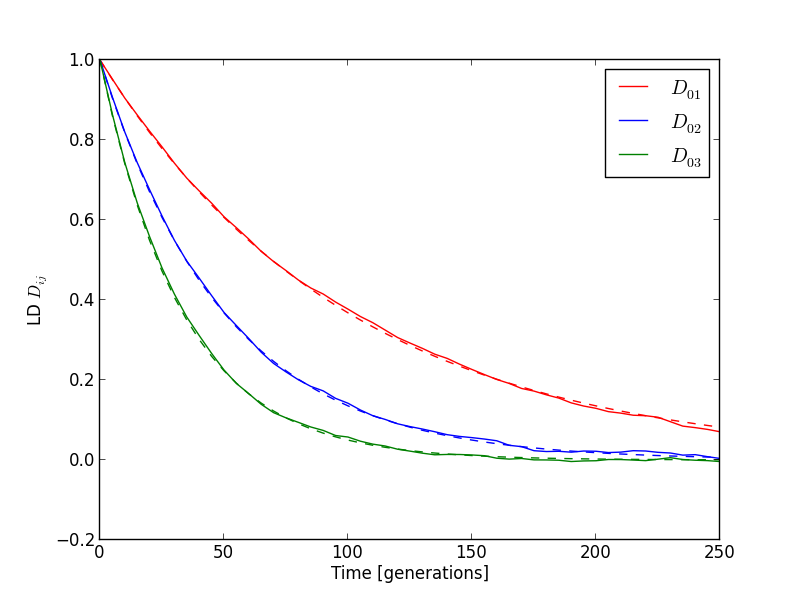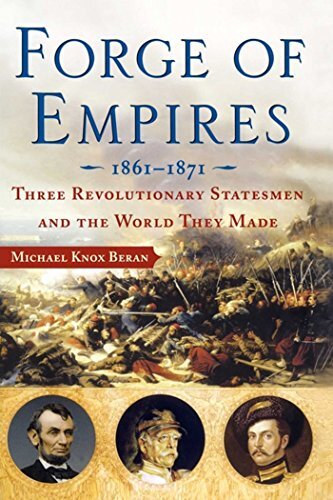The Long View 2007-10-28: The Fitness of Natural Selection; Macrohistory and Generations; The Decisive Lifetime

Decay of linkage disequilibrium
This is a pretty good case of a time when not looking at something quantitatively produces immense confusion. In the the case John J. Reilly mentions here, distinguishing between traits under selection and things that happen to be correlated with those traits, is something with a pretty robust theory behind it.
Depending on the available data, specific instances can be tricky in practice, but reliable data over a large enough number of generations makes the difference abundantly clear.
The Fitness of Natural Selection; Macrohistory and Generations; The Decisive Lifetime
Why Pigs Don't Have Wings is the title of an essay in the October 28 issue of the London Review of Books. It is a critique of the adaptationist element of Darwinism, though not of the "common descent" feature. The author is Jerry Fodor, of whom the journal in question tells us only that he is writing a book with Massimo Piattelli-Palamarini on non-adaptive evolution. Quite likely the author is this Jerry Fodor of Rutgers University, one of the ornaments of the New Jersey intelligentsia.
The author expands on Stephen J. Gould's and Richard Lewontin's notion of "spandrels," of organic traits that are not selected for but which are in some way correlated with adaptive traits. Fodor's principal argument is that there is no way to distinguish the adaptive traits from the non-adaptive ones, because both are features of "the more fit," of the organisms that do in fact survive and reproduce. Strict adaptationism, in Fodor's view, holds that organisms are chiefly structured by information provided by the environment in which they evolve: natural selection creates the phenotype. What really happens, he proposes, is that natural selection works on the endogenous nature of an organism. That provides a floor that limits the range of possible organisms, but the phenotype is actually produced by the organism's endogenous nature, which generates structures that tell us nothing at all about the environment.
Fodor's position is not as extreme (or perhaps as lucid) as that of Simon Conway Morris, yet it has produced audible unhappiness on those regions of the Web where people are keen to defend Darwinism at all costs. The Darwin Blog attempts to refute Fodor point-by-point, or at least to demonstrate that he is trying to pass off a commonplace as an impending scientific revolution.
Deep Thought and Silliness is of similar mind. As an unanswerable rebuttal to Fodor, he cites Price's Equation. That equation is, by design, a clarifying tautology that, if I understand it correctly, rigorously defines selected traits in terms of fitness, and vice-versa. Even if I don't understand it correctly, Deep Thought and Silliness helpfully explains its application to this context.
Put simply, it doesn't matter whether we can distinguish between selection for traits A and B if they're correlated.
I suppose it doesn't, but if it doesn't make a difference, then Fodor's point stands: phenotypes provide much less information about the environment than a strong interpretation of natural selection would seem to promise.
This is all a question of degree, I'm sure. However, I think that Fodor's main points are sufficiently plausible to put the whole Neo-Darwinian industry at risk. As he tells us:
The years after Darwin witnessed a remarkable proliferation of other theories, each seeking to co-opt natural selection for purposes of its own. Evolutionary psychology is currently the salient instance, but examples have been legion. They’re to be found in more or less all of the behavioural sciences, to say nothing of epistemology, semantics, theology, the philosophy of history, ethics, sociology, political theory, eugenics and even aesthetics. What they have in common is that they attempt to explain why we are so-and-so by reference to what being so-and-so buys for us, or what it would have bought for our ancestors. ‘We like telling stories because telling stories exercises the imagination and an imagination would have been a good thing for a hunter-gatherer to have.’ ‘We don’t approve of eating grandmother because having her around to baby-sit was useful in the hunter-gatherer ecology.’ ‘We like music because singing together strengthened the bond between the hunters and the gatherers (and/or between the hunter-gatherer grownups and their hunter-gatherer offspring)’. ‘We talk by making noises and not by waving our hands; that’s because hunter-gatherers lived in the savannah and would have had trouble seeing one another in the tall grass.’ ‘We like to gossip because knowing who has been up to what is important when fitness depends on co-operation in small communities.’ ‘We don’t all talk the same language because that would make us more likely to interbreed with foreigners (which would be bad because it would weaken the ties of hunter-gatherer communities).’ ‘We don’t copulate with our siblings because that would decrease the likelihood of interbreeding with foreigners (which would be bad because, all else being equal, heterogeneity is good for the gene pool).’ I’m not making this up, by the way.
Readers will recall that public incredulity about evolutionary biology began to grow about 25 years ago. The cause was not a recrudescence of religious fideism, but the appearance of a new class of science popularizers who used natural selection to underwrite a litany of unpersuasive metaphysical claims of the anti-theist variety. The effect was to discredit the genuine science in their books. Since then, the claims have become ever more cosmic. Frankly, I think that a pruning of the claims made for evolutionary biology in general and for natural selection in particular would greatly enhance the cultural credibility of science.
Many of my readers may differ from this assessment. However, here is something we can all agree on:

Macrohistory and generational history are two high concepts that meet occasionally but have never had the opportunity to get to know each other. Perhaps their lack of acquaintance will soon be remedied. In the Fall 2007 issue of Comparative Civilizations Review (the journal of the International Society for the Comparative Study of Civilizations), outgoing ISCSC president Lee Daniel Snyder includes these thoughts in a piece entitled "Civilizations and the Fourth Turning":
[I] published my major work in 1999 on Macro-History [Macro History: A Theoretical Approach to Comparative World History], where I argued that all civilizations have a characteristic structure, a series of 300-400 year cycles. In turn, each cycle could be characterized by four stages, each stage taking 50 to 100 years; a Reform stage, a Revolutionary Stage, a Consolidation Stage, and a Disintegration Stage...Recently, I have discovered an amazing book by William Strauss and Neil Howe, called The Fourth Turning, What the Cycles of History Tell Us about America's Next Rendezvous with Destiny...I am of course hoping that this type of generational theory can be used to explain the dynamic character of all historical cycles, as mentioned above. Some obvious modifications would have to be made with the tightly constructed model just discussed. For instance, the Awakening generation would change when applied to the Reform Stage, the Revolutionary Stage, the Consolidation Stage, and the Disintegration Stage, reflecting the larger historical cycle but presumably retaining some of its generational characteristics.
Likewise with the Crisis generation, which should correlate with the transition from one stage to the next, should change, intensified in the Reform Stage, as reform turns to revolution, moderated in the Revolutionary Stage as radical change is transformed into compromise in the Consolidation Stage, and intensified again in the Disintegration Stage. This pattern would, of course, need to be substantiated by detailed historical analysis, but if it is, it would add considerable analytical power to the structural model.
* * *
Finally, here's a book I have not read yet, but which looks interesting, if for no other reason than that it seems to mirror my suggestion that the period 1860-1945 (or thereabouts) is a particularly intelligible unit of Western history:

Actually, in that group of Russia, Germany, and the US, I would have omitted Russia as non-Western, but the concept is close enough.
Copyright © 2007 by John J. Reilly
Support the Long View re-posting project by downloading Brave browser, and then trying it out. With Both Hands is a verified Brave publisher, you can leave me a tip too!



Comments ()